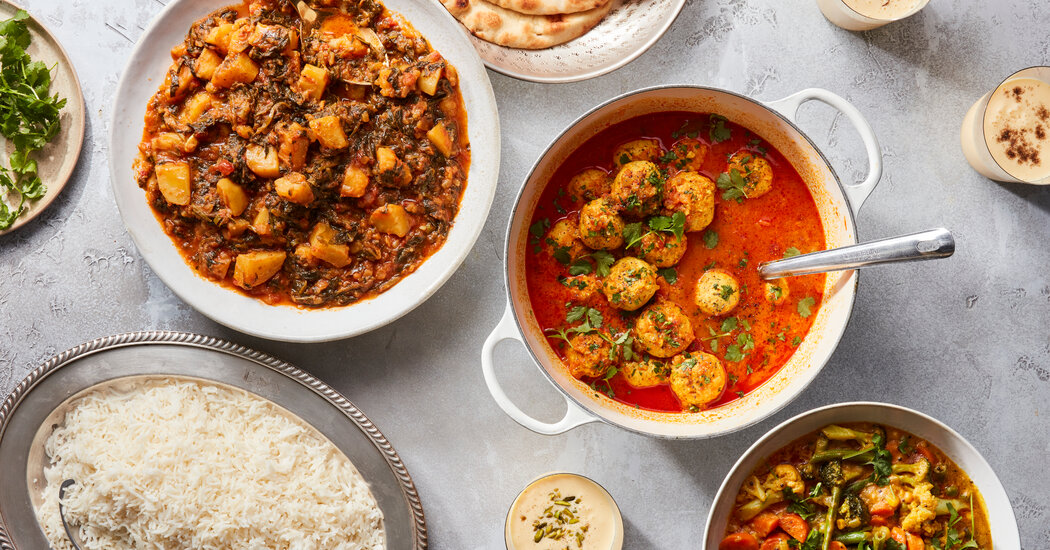
Maryam Jillani remembers the fervor around Eid al-Fitr celebrations ushered in by the end of Ramzan, the month of fasting and spiritual contemplation for Muslims. Endless meals included biryanis and kofta, lamb in its various iterations, milky-syrupy desserts, all laid out on embroidered tablecloths, among the good china and silverware, in drawing rooms across the Muslim world.
Ms. Jillani, the founder of the Pakistan Eats blog, said trying to recreate the bigness of Eid and its feasts is “exhausting.” After years of feeling similarly fatigued, and a couple of years of not hosting at all, I now throw more relaxed Eid parties.
I used to feel that guests had to know the best of me: aloo gosht made with goat sourced from the best halal butcher, 8-hour haleem cooked with homemade stock that had taken even longer. One year, when milk for kheer was slowly reducing over the stovetop, it boiled over just as the blender I was using to make nimbu pani erupted. My husband, in pajamas readying for bed, asked, “Who is this for?”
“I’m having fun, OK!” I yelled back. But it got me thinking.
I was reminded of the smaller, easier parties I hosted as pandemic lockdown loosened, and how my friends and I approached these meals with a renewed, almost sacred sense of joy. Meeting and sharing a meal was enough of a reason to celebrate, no matter the scale.
Hosting Eid is a way to connect with community, and Ms. Jillani has been re-examining what that means for her. “My 20s were all about the elaborate daawat. Now, in my 30s, I do what’s convenient and mark the occasion in ways that work for me: one main dish fit for a special occasion, something sweet, friends — all the elements are there.”
Circumstances often dictate the preparations. “People don’t always have the luxury of taking time off,” Fariha Khan, co-director of the Asian American Studies program at the University of Pennsylvania, said. Cooks, traditionally women, no longer have time to prepare everything from scratch, especially if they’re working outside the home, and now supplement a holiday meal with a few items from the local Desi restaurant.
“For our mothers’ or nanis’ generations, it would be unheard of to order anything from outside,” Dr. Khan said. But doing so means more time to celebrate. This Eid can be a chance to let go of things that no longer serve, and to reflect and be joyful by preparing for the holiday with ease.
That’s the plan here, a simple menu using shortcuts like frozen vegetables and mangoes. And the special things on the table, like kofta and samosas, can be made ahead and simply pulled from the freezer to heat. In the end, the dishes below make a festive meal and you can even outsource dessert. It’s an Eid celebration without the fuss and all of the intent: to simply gather.
The intoxicating sweetness of mangoes is balanced by yogurt and milk in this chilled drink. Add honey if your fruit isn’t as sweet, and finish this treat with cardamom and nuts.
These delightful little balls of spiced chicken, tender and cooked in gravy, can be made ahead of time and reheated just before serving.
Onion, tomatoes, ginger, garlic and layered spices give humble potatoes and spinach a fiery punch in a dish that cooks quickly.
In the Indian coastal state of Kerala, where coconuts are abundant, this dish calls for fresh coconut. This quick, convenient version skips fresh coconut and uses cashew butter in place of homemade nut paste. Cutting corners doesn’t quell any flavor in this recipe.
This everyday essential is key to any meal and especially important to get right for this holiday. This foolproof formula for long grain basmati rice yields perfectly fluffy grains.



